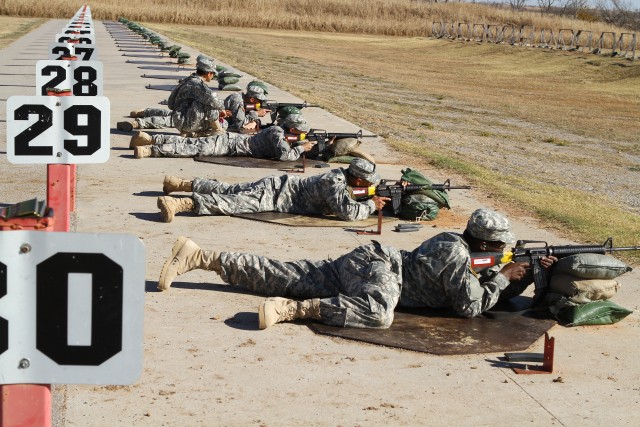FORT SILL, Okla.-- These future Soldiers may have worn different uniforms in the past, but they're only wearing Army green now.
The Warrior Transition Course (WTC) is graduating its last class at Fort Sill Dec. 9 and they're making sure these trainees measure up to Army standards.
D Battery, 1st Battalion, 79th Field Artillery was at the Pvt. George Wanton 25 Meter Range Nov. 22 where trainees were zeroing, grouping and then going on to qualify on their M-16 rifles.
"Basically the concept is we take Sailors, Airmen, Coast Guardsmen, Marines or Soldiers (who) were prior (service) in the military and we just kind of give them a good overview of the Army versus whatever their previous branch of service was," said 1st Sgt. Wilbur Sauerbry. He said the majority of the trainees are from the Navy or Air Force with some of the other services mixed in.
The course is given in lieu of Basic Combat Training and is meant to produce well-disciplined, motivated and physically fit Soldiers, who understand the Army values, warrior ethos and are fully prepared for their next level of training.
They learn basic Soldier skills as well as the Army's rank structure and military courtesies, brushing up on such core tasks as teamwork development, first aid, drill and ceremony, and land navigation. The goal is to introduce those coming from other services to the Army and to refresh the skills of former Soldiers.
WTC is five weeks long and Sauerbry said for these 217 trainees, that means covering major milestones that are in BCT such as basic rifle marksmanship, advanced rifle marksmanship and tactical training, only in half the time.
"Our other biggest challenge is the physical aspect. A lot of the Soldiers that we get are a lot older than what they get in basic training. In this cycle our oldest male is 53 and we've had 55- and 56-year-olds. So it's very easy just through the normal (Physical Training) that we do to get injuries," said Sauerbry.
Age isn't the only reason for injuries. The drill sergeants said sometimes it's just the extreme change from service to service.
"I had a Coast Guard female (who) came through and she got injured within the first two weeks because she said once she finished basic training in the Coast Guard they didn't do PT. It was all about missions and training up for missions and things like that so she wasn't used to doing PT," said Staff Sgt. Sara Peterson, D Battery, 1st-79th FA.
Peterson said they try to progress the exercises but it's difficult to do in such a short amount of time, especially when the trainees are expected to pass a PT test and be able to keep up with the younger Soldiers they will join in Advanced Individual Training.
There is an upside to tougher PT and it's definitely noticed by those in the course.
"I feel like I'm going to be more tough as a Soldier. Even the exercises are more intense. (I'm getting) more of a workout than I did in the Air Force," said Pfc. Jameelah Forju.
For many, the chance at leading the way is the reason why the Army was where they wanted to serve.
"I'm originally coming from the Navy and I wasn't going where I wanted to go. The Army had all the opportunities available to me where the Navy didn't," said Sgt. John Gan, D Battery, 1st-79th FA.
Gan applied to be a Navy SEAL but was not accepted. He said he will send in his package for U.S. Army Special Forces and is determined to get there. For Gan the difference in terminology used by the Army was noticed right away, but he said to him it made more sense. For instance, he said a wall is a wall in the Army, not a bulkhead like in the Navy's maritime jargon. He said the other difference he's noticed the second go-round, is he has more confidence.
"It's really different because the first time I went through basic training everyone you go through with is a civilian essentially and now everyone has experience so you're not dealing with people who don't know what they're doing," said Gan.
"Here it's different because you have that outside perspective. You understand that the drill sergeant is a person just like you. You're not like 'Oh my gosh you have military experience and I don't,' whereas the first time through basic training, you're like a baby or a toddler in a new world," said Gan.
For him the hardest part of WTC is having the previous experience but still being treated like a "newby." It doesn't deter him though because he's on a mission, and he is determined to overcome and adapt to life as a Soldier.
"There's a lot of people trying to use what they knew before saying, 'Hey, this is how we did it in the Air Force or this is how we did it in the Navy.' Well hey we're all in the Army now so we need to leave that behind and start over," said Gan.


Social Sharing